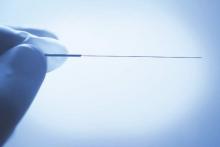VALENCIA, SPAIN – Acupuncture is as effective as standard pharmacotherapy for migraine prophylaxis, according to a randomized, clinical trial. Forty-four percent of patients in the acupuncture group were deemed treatment responders based upon at least a 50% reduction in headache days per month at 4 months of follow-up, compared with baseline, Dr. Giulia Giannini reported at the International Headache Congress.
The responder rate in the prophylactic pharmacotherapy group was similar at 38%. However, it must be noted that half of the migraineurs assigned to the medication group dropped out of the study for various reasons – No. 1 being treatment side effects – and in this study the responder rate was based upon patients who made it to the 4-month mark, noted Dr. Giannini of the University of Bologna (Italy).
The study included 85 patients, none of whom had been on prophylactic medication during the previous 3 months. They were randomized to a series of 12 acupuncture sessions or to whatever conventional prophylactic drug the physician and patient agreed was most appropriate.
Eight of 42 patients in the acupuncture group and 21 of 43 controls discontinued the study.
Among the study completers in the acupuncture group, migraine frequency dropped from 9.26 headache days per month at baseline to 6 days per month at 4 months. The group on prophylactic pharmacotherapy improved from 7.95 to 6.24 headache days per month.
These results are consistent with the findings of several published clinical trials comparing acupuncture with prophylactic antimigraine drugs, including one in which acupuncture proved more effective than valproic acid (Minerva Anestesiol. 2013;79:634-42). The published data prompted a Cochrane systematic review which concluded that acupuncture is at least as effective as prophylactic drug therapy, has fewer adverse effects, and should be considered a legitimate treatment option (Cochrane Database Syst. Rev. 2009 [doi:10.1002/14651858.CD001218.pub2]). Dr. Giannini noted at the meeting sponsored by the International Headache Society and the American Headache Society.
No serious adverse events occurred in either study arm.
The study was funded by the Emilia-Romagna (Italy) Department of Health. Dr. Giannini reported having no financial conflicts.


